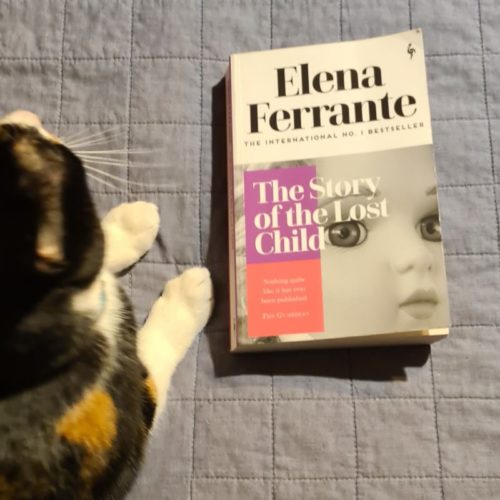It can be difficult for a book nerd like me to describe what makes a book great. For some of us, action is not what it takes. Characters, locations, maybe incidents are all I need. And nobody in my memory has done this better than Italian author Elena Ferrante in her Neapolitan Quartet, starting with My Brilliant Friend.

This series of four books, about the lives of two Neapolitan girls, from the ages of six until their sixties, is the most extraordinary reading I’ve encountered since first setting eyes on 100 Years of Solitude by Gabriel Garcia Marquez. And just like Marquez, Ferrante blends the social, political, intellectual, and intimate in a way that brings the city of Naples and its residents to life in a way that is unexpected in modern literature. We see the world completely through the lens of the narrator, Elena Greco. Every moment, every word, thought, and action is translated first by Elena (the character). Everything is surprising, yet the writing is unexpected in its intimacy. We are not watching Elena’s world like an omniscient observer. We are literally looking through her eyes. There is no separation between the reader and Elena. So, when Elena takes a lover later in life, we are shocked, but we know why she does it, because we, too, are Elena. And that is what makes Ferrante’s work extraordinary. She wraps us up in this hasty world of suburban Naples in the 1950s. We are so completely immersed in their lives that the death of a beloved character pains us, too.

I came to Elena Ferrante late. It’s a nom de plume. The author has remained anonymous after all these years and successes. As far as I know, she could be AI. Her writing is everything I didn’t know I needed in a work of fiction. She breaks all the rules. Her protagonist and every single thought seep onto the page. Nothing she thinks goes unsaid. Even dialogue is filtered through the protagonist’s interpretation. Ferrante even breaks the divine “show, don’t tell” rule. It’s the number one rule of writing fiction. And yet, there she is, doing it so well.
You could call the quartet a saga, it seems the correct term. These books are no joke. At almost 2000 total pages, this is a saga that seems to follow no rules. The hero’s journey be damned – super short chapters separated by number, new chapters appear anywhere on the page. New chapters start on the left or the right! It creates a rhythm. No blank spaces to separate scenes. I become part of its rhythm, compelled to read one more page, one more chapter, because it’s just a short chapter, a few paragraphs. Just one more.
Ferrante weaves us through the despair of growing up in postwar southern Italy, its poverty, unemployment, black market, hustlers. While others romance about La Dolce Vita, Ferrante reveals the other Italy. While the north holds a spotlight on art and beauty, southern Italy is shown to be not too dissimilar to the gladiator days of old – kill or be killed. Everyone is crooked if given the chance, and desperation. Everyone is selfish and flawed and cruel if given the opportunity. And there are many opportunities.
Mainly, though, Ferrante exposes a long, unlikely friendship between two girls. Both smart, both taking different paths – one making the most of opportunities, the other married at 16, her mind trapped in a well-furnished home by men who idolise her fearlessness, but only until the wedding day. Elena and Lila’s friendship is at once both treasured and destructive. After all, if you put a leopard in a cage, she’s still a leopard.

For me, a migrant child from a very Sicilian family, My Brilliant Friend; The Story of a New Name; Those Who Leave and Those Who Stay are the stories of my family. I have heard, and still hear, the scathing words that only girls dare utter, the jealousies, the familial violence. To most, the words that Elena’s mother utters (“I’ll smash your face if you don’t shut up”) may seem over the top. To those of us who have grown up in Southern Italian families, they are not.
I can tell that I’ve read a great book when I finish it and my immediate reaction is to wish I had never read it so I can experience it for the first time.
And just like 100 Years of Solitude, I long to reread the Neapolitan Quartet by Elena Ferrante, but I know I can’t. I can’t relive them. Not yet.
PS. Watch the HBO series. It’s a masterful and loyal retelling of the books. I can’t wait to see the interpretation of the final book, set for release in 2023.

